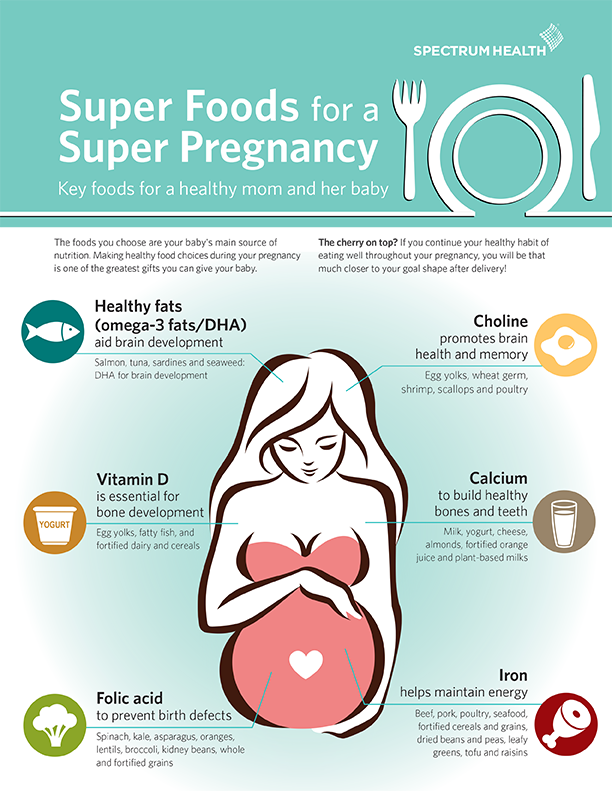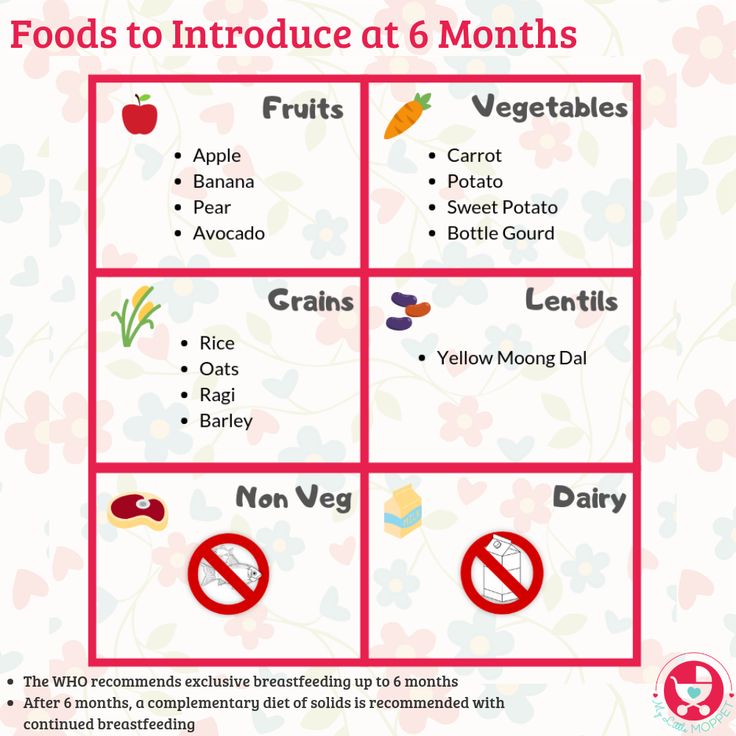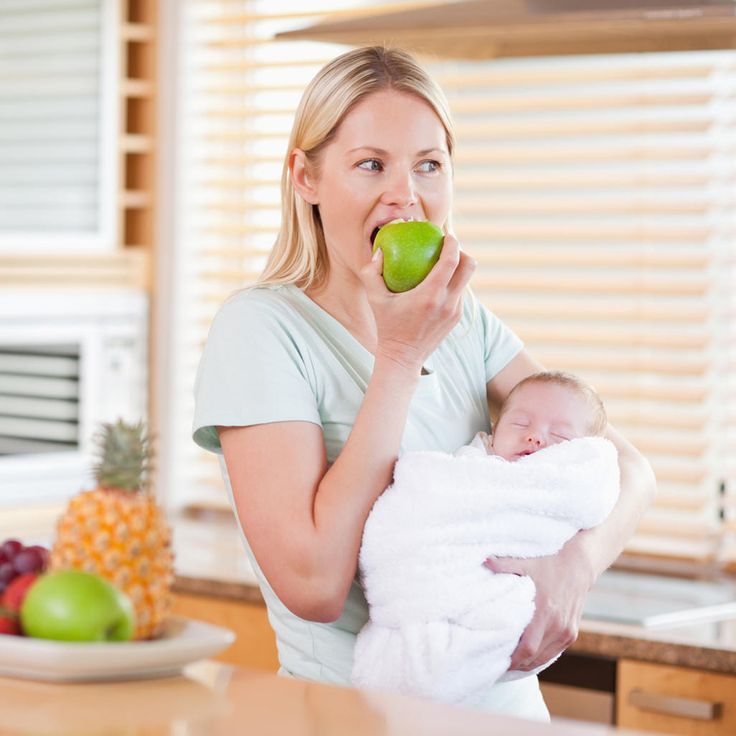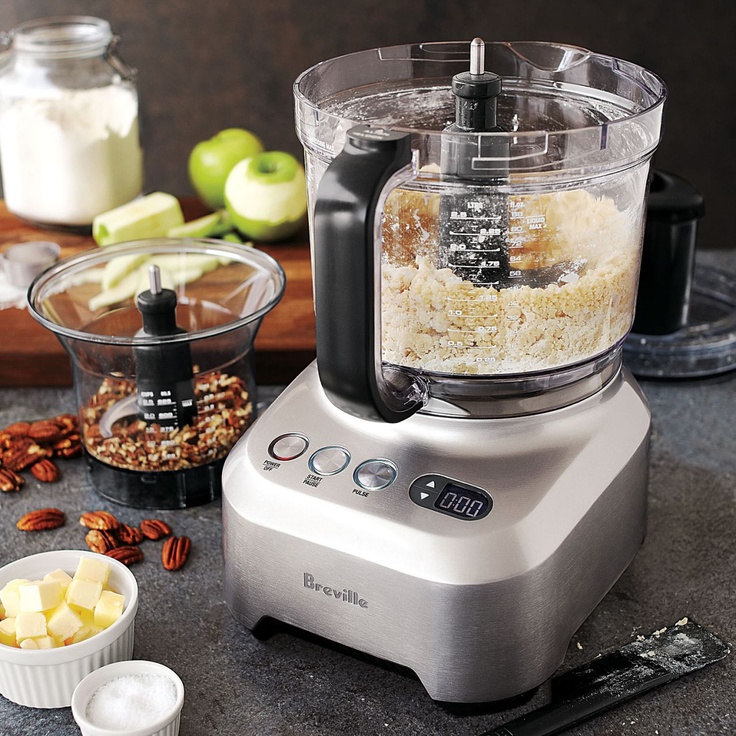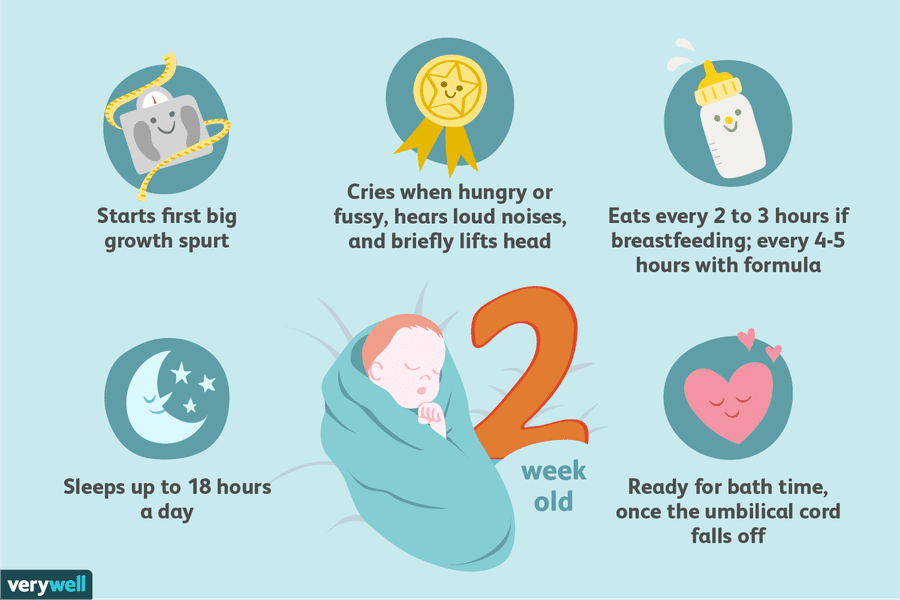What is good food for baby brain development
10 Foods to Build Baby's Brain Development
Has the time come to transition your baby into the world of solids? (Raise your hand if you’re feeling excited.) Each baby’s first experience with solids is different—some babies take to their first foods right away, while others require some trial and error. Allow your baby to sample a variety of healthy and nutritious foods, and let patience—and nutrition—be your guide, especially to support that growing brain.
Remember to not start solids until your baby is 6 months old (not 4 months, as used to be the case), and always check in with your child’s pediatrician before starting solids, in case there are any specific considerations for your little one. Once you get the go-ahead, focus on foods that are rich in nutrients that support your baby’s healthy growth.
1. Avocado
View this post on Instagram
A post shared by Kiddo Feedo™ (@kiddofeedo)
Creamy, mashed avocado is a popular first food. Avocado is a nutrient-dense fruit with plant-based fat, vitamins and minerals. Not only is it nutritious, as fats contribute to brain cell development, but the texture is soft and easy for baby to tolerate.
Related: AAP recommends breastfeeding for at least 2 years. Here’s how to make that happen
2. Greek yogurt
View this post on Instagram
A post shared by My Little Bean (@mylittlebean9)
Whole-milk yogurt is a nutritious early food because it contains calcium, protein and healthy fats. The culturing process involved in making yogurt helps break down the proteins, making them easy for babies to digest, and incorporating fats into your baby’s diet will help develop their brain cells. Plus, babies tend to like the rich, creamy texture of Greek yogurt. Because it contains cows’ milk, some pediatricians recommend waiting to introduce yogurt between 9 and 10 months of age, so check with your child’s doctor first.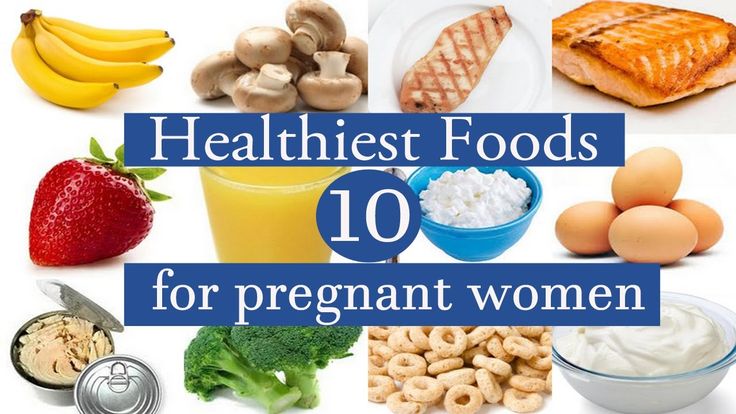
Related: Everything you need for starting solids with your baby
3. Blueberries
Dark berries like blueberries are packed full of antioxidants, which protect the brain from stress and damage. You can offer blueberries mashed or blended into a smoothie, yogurt or oatmeal or as a finger food.
4. Eggs
View this post on Instagram
A post shared by Kawn al-jabbouri | Babyfood & Kidsfood (@babyfooduniverse)
Egg yolks contain cholesterol, which is what comprises the outer lining of brain cells. In addition, they contain fat-soluble vitamins as well as choline, selenium and vitamin B12—all important for brain development.
Related: 5 ways to help your picky eater get the nutrition they need
5. Whole grain oatmeal porridge
Offering your baby a whole-grain cereal blend is a nutrient-rich option.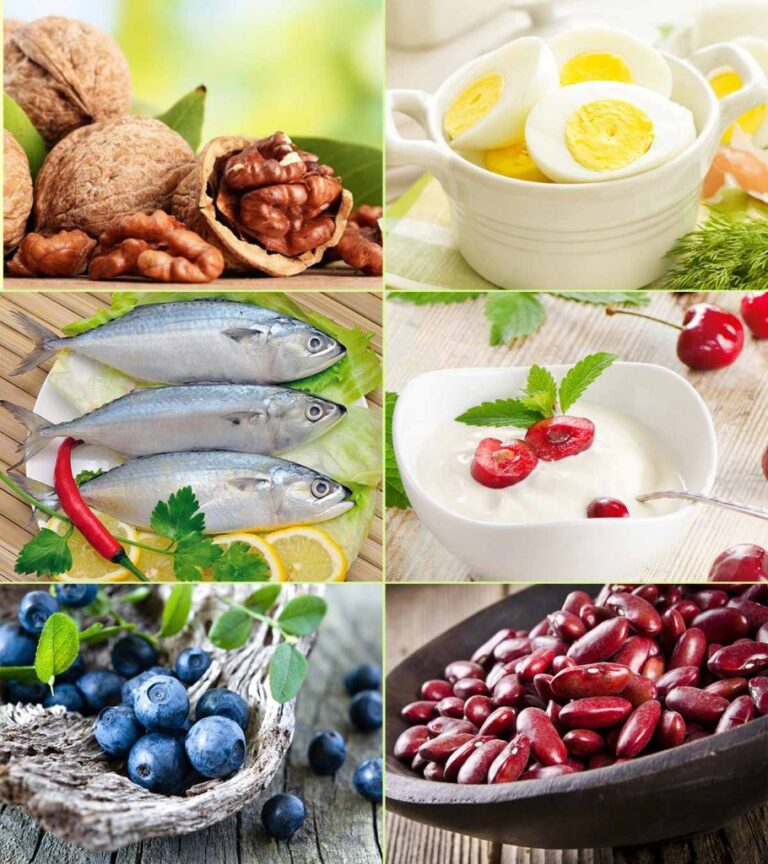 Whole grains such as oatmeal, quinoa and barley should be pulverized and blended into a fine powder form and mixed with water or breast milk. You can also mix in a bit of yogurt or a fruit/vegetable blend. Whole grains offer fiber and a source of protein.
Whole grains such as oatmeal, quinoa and barley should be pulverized and blended into a fine powder form and mixed with water or breast milk. You can also mix in a bit of yogurt or a fruit/vegetable blend. Whole grains offer fiber and a source of protein.
6. Nut butters
Traditional nuts in their butter form are a good source of healthy fat, protein and fat-soluble vitamins. Peanut, cashew and almond butter are all options to offer your baby when you feel they’re ready.
You could offer it as a small spoonful mixed into your baby’s cereal or porridge blend, yogurt or even applesauce.
7. Apples
View this post on Instagram
A post shared by Anita Mirchandani (@fitnutanita)
These nutritious fruits contain quercetin, which helps stimulate brain activity. Apples, whether pureed, cooked soft or raw, are easy to offer as a first food and throughout your baby’s transitional food stages.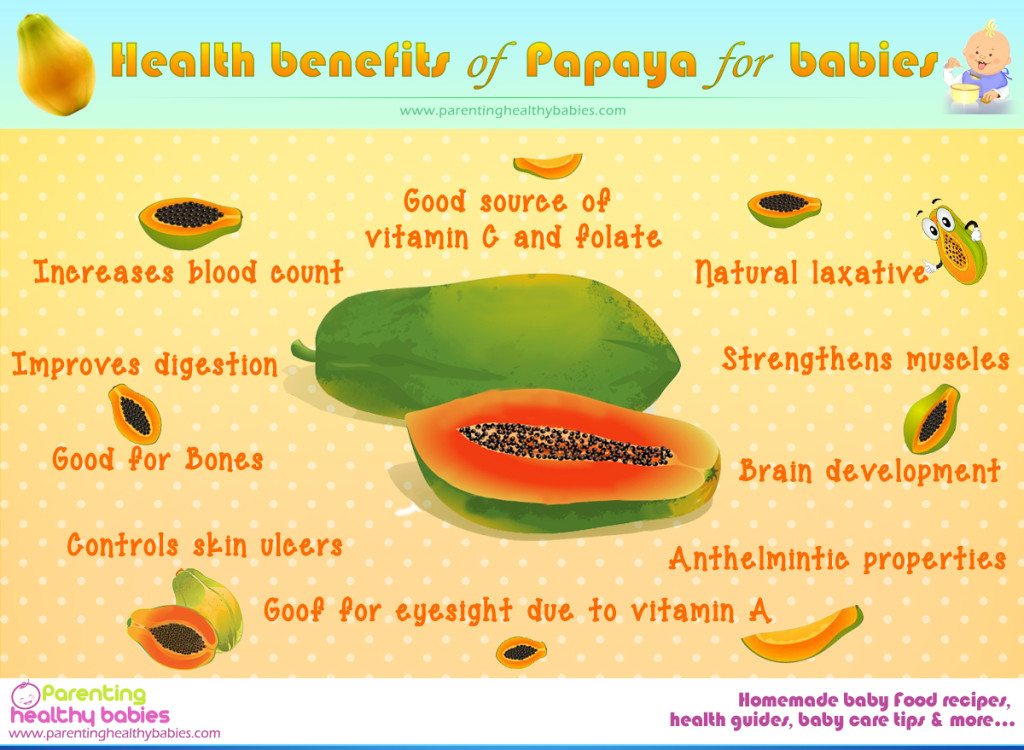 (Check out this great applesauce recipe!) As they become more comfortable with finger foods and as they develop teeth, you could offer apples with nut butter as a healthy pairing.
(Check out this great applesauce recipe!) As they become more comfortable with finger foods and as they develop teeth, you could offer apples with nut butter as a healthy pairing.
Related: Should I give my baby vitamins? A dietitian weighs in
8. Lentils
View this post on Instagram
A post shared by Kiddo Feedo™ (@kiddofeedo)
Lentils are available in various forms and are especially nutritious because they contain fiber, iron and protein. They’re soft and easy to cook (no long soaking periods required) and can easily be blended into puree or soup form. They’re also one of the more neutral-tasting legume and bean options to initially offer.
9. Leafy greens
While these may be hard to offer initially as a single vegetable, they could be used as a blend so they’re tolerated better.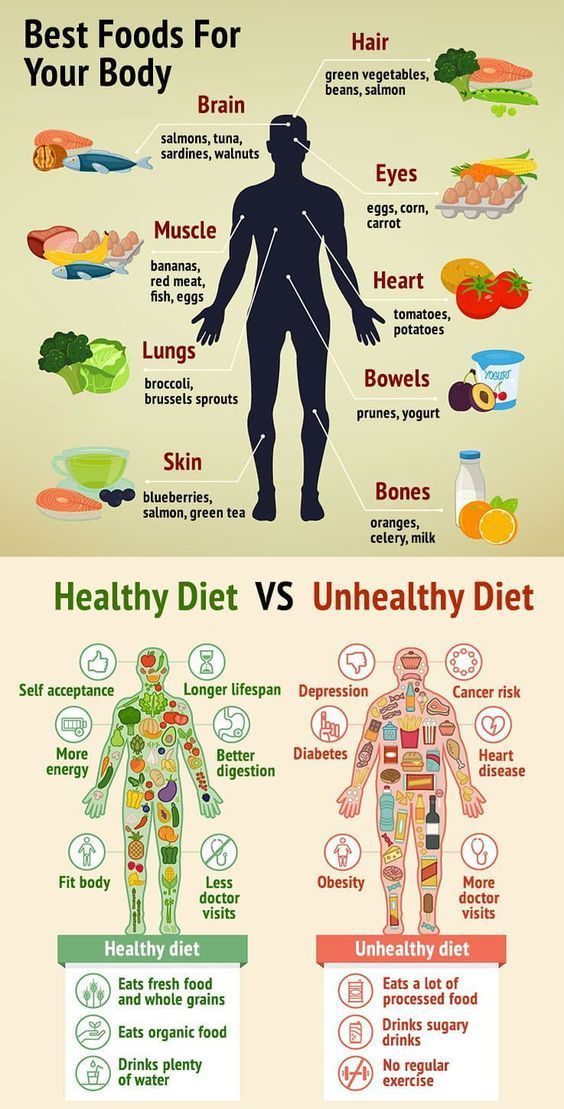 For example, you could blend spinach with apple or carrots, or make a spinach pesto to coat pasta once your little one is older. Because many leafy greens contain nitrates, some pediatricians recommended them as a later introduction at perhaps closer to 10 months onwards.
For example, you could blend spinach with apple or carrots, or make a spinach pesto to coat pasta once your little one is older. Because many leafy greens contain nitrates, some pediatricians recommended them as a later introduction at perhaps closer to 10 months onwards.
Leafy greens such as spinach or kale offer lutein and vitamin K, which contribute to brain activity.
10. Salmon
Babies’ growing brains require DHA, an omega-3 fatty acid that is essential to cognitive development. Salmon is an excellent dietary source of DHA. You could mash some cooked, mix into a puree or even create a salmon burger or nuggets if finger foods are accepted.
Related: Yes, you can eat fish while pregnant—new study shows relationship between pregnancy and mercury exposure
A version of this post was originally published on Sept. 28. 2021. It has been updated.
9 Foods To Boost Your Baby's Brain Development During Pregnancy – feedmomandme
Written by: Co-Founder Amanda Capriglione, RDN, CDN
Medically Reviewed by Dr. Nicole Palmer, DO
Nicole Palmer, DO
In this article
Every parent naturally wants their baby to be healthy and grow up to be smart. Scientific research suggests that your diet during pregnancy can help boost fetal brain development. Optimal nutrient intake will not only have you flourishing but also your growing baby. We will be discussing the nutrients and foods that help boost a baby’s brain development while pregnant.
1. TAKE YOUR DAILY PRENATAL VITAMIN
Taking a daily complete prenatal plus DHA multivitamin will help you get those extra nutrients you may not be getting in your everyday diet. Look for a prenatal with DHA and Choline, both essential for baby’s brain development. We recommend taking Feed Mom & Me Complete Prenatal + DHA Multivitamin.
Vitamins supplements are meant to supplement your well-rounded diet regimen. They help enhance your intake of nutrients and vitamins along with your everyday food intake. Vitamin supplements aren’t meant to be used in place of real food.
Vitamin supplements aren’t meant to be used in place of real food.
For more information on prenatal vitamins, please check out our Benefits of Feed Mom & Me Complete Prenatal with DHA Multivitamin Blog. To purchase our Prenatal Vitamins, click here! You got this mama, you and your little one are going to thrive!
2. OMEGA 3, LIKE DHAActive forms of omega-3 fatty acids are docosahexaenoic acid (DHA) and eicosapentaenoic acid (EPA), which are vitally important for your developing baby’s brain & retina during pregnancy. DHA is the critical component of the cell membrane in the brain, eyes, and nervous system. It also supports the development of the cerebrum, cerebellum, and brain stem.
The fetal’s brain growth accelerates during your second trimester and continues growth for several years after birth. During pregnancy and lactation, it is recommended women’s daily intake of at least 200 mg of DHA. Both DHA and EPA are primarily derived from seafood and algae.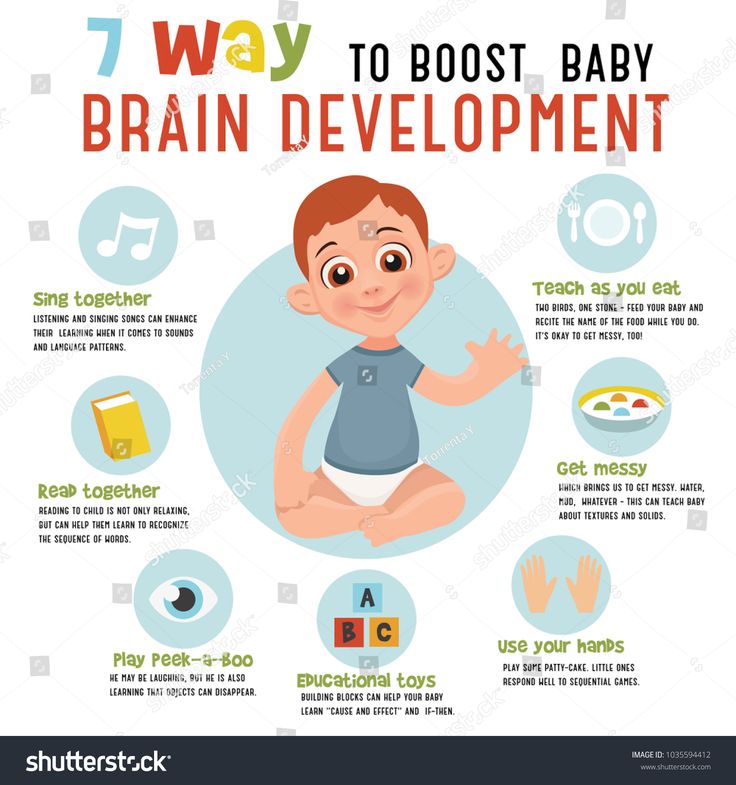 Consuming 1 to 2 servings of seafood per week and a daily prenatal with DHA will help with your omega-3 intake.
Consuming 1 to 2 servings of seafood per week and a daily prenatal with DHA will help with your omega-3 intake.
- Fish such as Salmon, Mackerel, Tuna, Herring, and Sardines. (No more than 12 ounces per week)
- Fortified Eggs
- Flax and Chia Seeds
★ A good prenatal vitamin with natural DHA will smell a little fishy.
Read more on DHA in our blog, All You Need To Know About Prenatal Vitamins And DHA.
3. CHOLINECholine is vital for the proper development of your baby’s brain and spinal cord. It also helps form the neurotransmitters in the brain, which the nervous system uses to transmit messages between neurons, and/or neurons to muscles. It also influences lifelong memory functions for your developing baby.
BEST FOODS RICH IN CHOLINE FOR PREGNANT WOMEN:
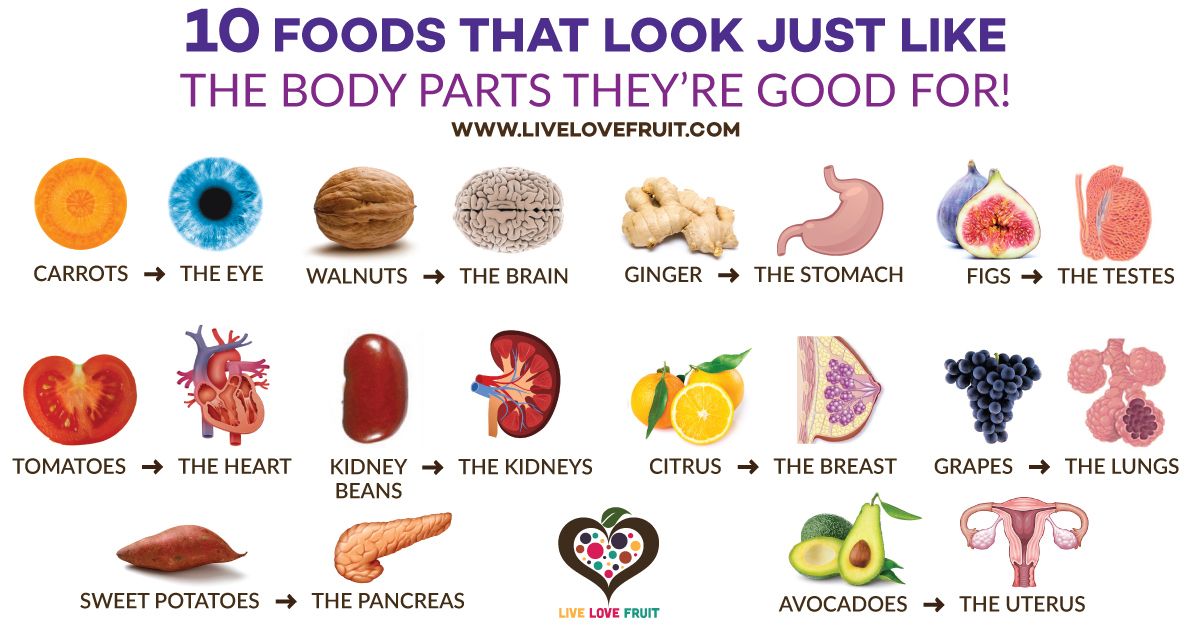 (No more than 12 ounces per week)
(No more than 12 ounces per week)Read more on choline in our blog, Choline during pregnancy.
4. VITAMIN B COMPLEXVitamin B complex plays a critical role during pregnancy for your developing baby’s brain. They help aid the production of numerous aspects of brain function, including energy production, DNA/RNA synthesis/repair, genomic and non-genomic methylation, and the synthesis of numerous neurochemicals and signaling molecules. They can also be considered a potent antioxidant capable of protecting the brain’s cellular membranes.
BEST FOODS RICH IN VITAMIN B COMPLEX FOR PREGNANT WOMEN:- Poultry, Lean Beef, and Meat.
- Fish such as Tuna and Salmon. (No more than 12 ounces per week)
- Dairy Products such as Eggs, Milk, Yogurt
- Nuts and Seeds such as Peanuts, Sunflower Seeds, Hazelnuts, Pistachios, Cashew Nuts
- Legumes such as Chickpeas, Black-Eyed peas, and Kidney Beans
- Whole Grains such as Whole Wheat, Brown Rice, and Oats.

- Enriched and Fortified Foods such as many Breads and Cereals.
- Vegetables such as Mushrooms (especially shiitakes), Avocados, Potatoes, Asparagus, and Brussels Sprouts and Broccoli.
- Leafy Vegetables such as Spinach and Mustard Greens.
- Fruits such as Papaya, Oranges, and Banana.
- Dried fruits such as Apricots and Prunes.
5. ANTIOXIDANTS
Antioxidants protect your developing baby’s brain tissues and cellular membranes from damage and free radicals. Free radicals are unstable atoms that can damage cells. Produce contains the most amounts of antioxidants that are good for you and your baby. Try to consume seven servings of well-washed fruits and vegetables daily.
BEST FOODS RICH IN ANTIOXIDANTS FOR PREGNANT WOMEN:- Dark Chocolate
- Pecans
- Berries such as Blueberries, Strawberries, Raspberries, and Goji Berries
- Vegetables such as Artichokes, Broccoli, Asparagus, and Squash
- Leafy Vegetables such as Kale, Spinach, Cabbage, Lettuce, Collard Greens
- Root Vegetables such as Carrots, Beets, Radish
- Legumes such as Beans and Peas
- Avocados
★ Dark-colored produce often has more antioxidants.
Iron is one of the critical nutrients in developing a healthy baby. It helps your body produce hemoglobin, a protein that carries oxygen through your red blood cells, delivering life-sustaining oxygen to your baby. Oxygen helps flourish your developing baby’s brain growth. Make sure you stay hydrated when consuming iron to help avoid constipation. Check out our blog on the Top 15 Foods to Help Naturally Relieve Pregnancy Constipation.
BEST FOODS RICH IN IRON FOR PREGNANT WOMEN:- Lean Meat, and Poultry.
- Iron-fortified Breakfast Cereals and Breads.
- Legumes such as White Beans, Lentils, Spinach, Kidney Beans, Peas, and Edamame.
- Dried Fruits such as Raisins, Apricots, Peaches, and Prunes.
- Leafy Greens such as Spinach, Kale, Broccoli, and Collards Greens.
Read more on iron in our blog, Iron during pregnancy.
7. PROTEINEvery cell in your body requires protein’s numerous amino acids to help your body make new cells and repair cells.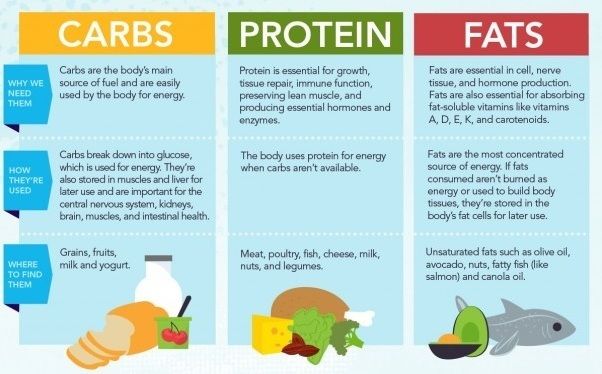 Research has shown that proteins are essential for the function of brain cells and the development of your baby’s brain.
Research has shown that proteins are essential for the function of brain cells and the development of your baby’s brain.
- Poultry
- Fish such as Salmon & Shrimp
- Dairy such as Eggs, Milk
- Legumes such as Beans, Lentils, Split Peas.
- Nuts & Seed such as Peanuts, Walnuts, Cashews, Pistachios, and almonds
- Whole grains
Your thyroid needs iodine to produce triiodothyronine & thyroxine hormones in both your developing baby and you during pregnancy. Iodine plays a crucial role in aiding the formation of your growing baby’s cerebral cortex and neocortex, visual and auditory cortex, hippocampus, and cerebellum. The fetal thyroid is not fully active up until the 20th week of pregnancy; therefore, your baby is entirely dependent on maternal thyroxine supply.
BEST FOODS RICH IN IODINE FOR PREGNANT WOMEN:- Seafood & Fish such as Cod, Tuna, Seaweed, and Shrimp.
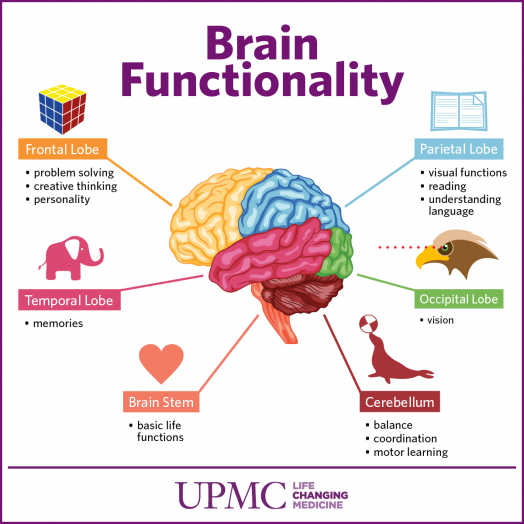
- Dairy products such as Milk, Yogurt, and Cheese.
- Iodized salt
Read more on iodine in our blog, The importance of iodine during pregnancy.
9. ZINCZinc is a key micronutrient that helps with the rapid growth and development of cells and tissue. Aiding the development of the brain's hippocampal and cerebellar. Making it essential for your baby’s brain development.
BEST FOODS RICH IN ZINC FOR PREGNANT WOMEN:REFERENCE
- https://www.feedmomandme.com/products/complete-prenatal-vitamin-with-dha
- https://www.ncbi.nlm.nih.gov/pmc/articles/PMC3046737/#B3
- https://pubmed.ncbi.nlm.nih.gov/26828517/
- https://www.feedmomandme.com/blog/15-foods-to-help-pregnancy-constipation
- https://www.sciencedaily.com/releases/2006/09/060905225522.htm
- https://pubmed.ncbi.nlm.nih.gov/23062035/
- https://www.ncbi.nlm.nih.gov/pmc/articles/PMC3506421/#:~:text=Zinc%20is%20essential%20for%20normal,on%20the%20offspring's%20nervous%20system.

- https://feedmomandme.com/blogs/mama-blog/all-you-need-to-know-about-prenatal-vitamins-and-dha
- https://feedmomandme.com/blogs/mama-blog/importance-of-choline-during-pregnancy
- https://feedmomandme.com/blogs/mama-blog/iron-during-pregnancy
- https://feedmomandme.com/blogs/mama-blog/the-importance-of-iodine-during-pregnancy
Food for the mind: foods that improve brain function at different ages smarter even in old age. Of course, it is better to “feed” the brain correctly throughout life, starting from the prenatal period.
What does our brain need?
Although our brain is only the size of a small head of cauliflower, it is the most voracious part of the body. By weight, it makes up only 2.5% of our total weight, and absorbs up to 20% of the calories we consume. There are several types of important foods, the regular use of which throughout life improves brain function, provides it with high-quality raw materials for the formation of new cells, and thus preserves our intelligence, preventing mental decline.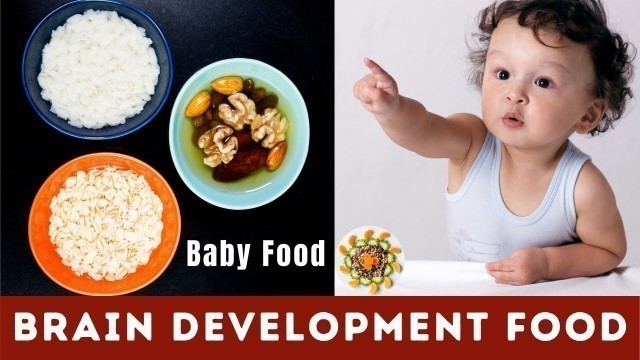 To satisfy the "brain" hunger, you need two types of food. Firstly, the fuel necessary for the daily work of brain cells and replenishing energy reserves. And, secondly, substances that would support his daily activities. nine0003
To satisfy the "brain" hunger, you need two types of food. Firstly, the fuel necessary for the daily work of brain cells and replenishing energy reserves. And, secondly, substances that would support his daily activities. nine0003
The following nutritional recommendations will help extend the life of our brain.
Before birth (fetal development)
- Photo
- Getty Images/Tetra images RF
What the brain needs
Children today are often diagnosed with Attention Deficit Hyperactivity Disorder (ADHD). Scientists have found out how the quality of the food of a pregnant woman affects the development of this syndrome in an unborn child. In particular, they turned their attention to omega-3 fatty acids. One of the leading experts on ADHD, Dr. Alex Richardson of the University of Oxford, says that there is no specific treatment or diet for this type of disorder yet, but foods rich in omega-3s can help relieve symptoms and improve overall health. After all, in order for the 100 billion brain cells with which a child is born to develop, a sufficient supply of folic acid, omega-3 fatty acids, iodine, iron and zinc is required. nine0003
After all, in order for the 100 billion brain cells with which a child is born to develop, a sufficient supply of folic acid, omega-3 fatty acids, iodine, iron and zinc is required. nine0003
What products contain it?
Bread, cereals, green vegetables, oranges or fruit juice are needed even during pregnancy, as these foods are rich in folic acid. Doctors also recommend that pregnant women take 0.8 mg of folic acid every day until the 12th week of pregnancy, and preferably at least 4 weeks before conception. Since some women require higher doses, it is best to discuss this with your doctor.
Fatty fish such as sardines, tuna, salmon, mackerel are the best source of long chain omega-3 fatty acids (EPA, DHA, DPA). And canola, flaxseed, and walnut oils provide us with ALA, another type of these fats. nine0003
Use iodized salt. Table salt is recommended for cooking pasta and vegetables, and sea salt can be added to ready-made dishes. Other sources of iodine are fish, dairy products, eggs, and baked goods with iodized salt.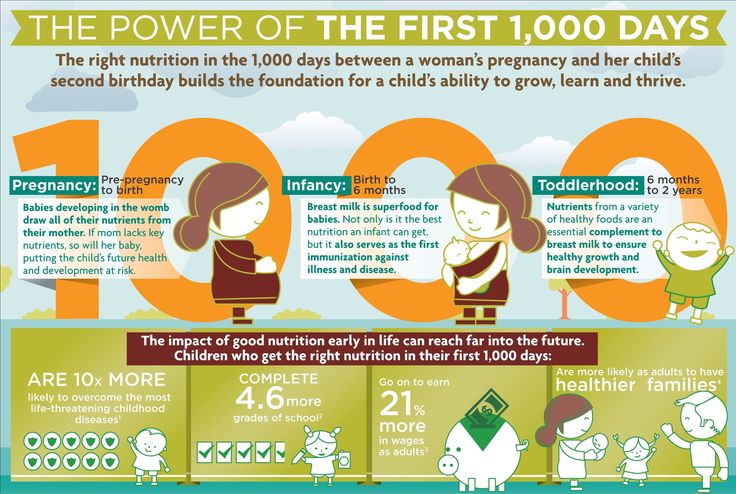
Red meat is the most affordable source of iron. If you don't eat meat or fish, include plenty of legumes, fortified breads and cereals in your diet. For better absorption of iron from these foods, take them with fruit juice, but not tea - it impairs the absorption of iron. Most of these products will also provide you with zinc. nine0003
Be careful!
Meat is a great option, but don't overdo the liver. It is an excellent source of iron, but it contains too much vitamin A. Too much of it can damage the brain development of the unborn baby. It is enough to eat liver dishes once a week. And be careful with fish oil supplements, they are also too high in vitamin A. Before taking them during pregnancy, check with your doctor.
Smoking and alcohol abuse are also dangerous for a child's brain development. During pregnancy, it is really important to give up bad habits. nine0003
Children under 3
- Photo
- Getty Images/Blend Images
What the brain needs
At birth, a baby's brain has about 100 billion cells, but it is only 15% developed.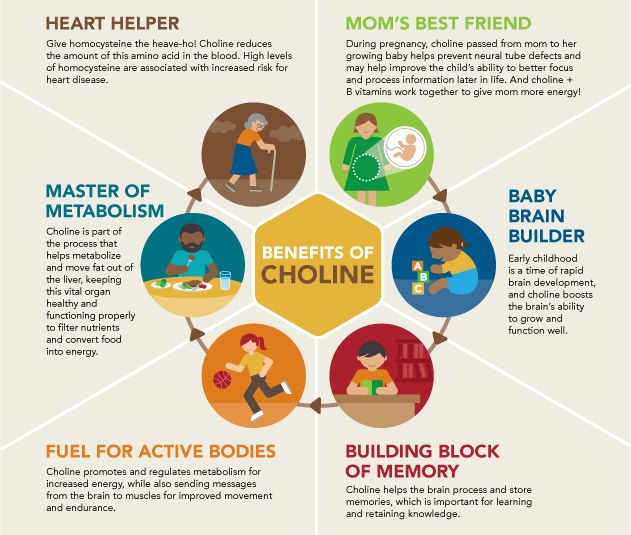 As they say, "the lights are on, but no one is home." The cells are already there, but there are no connections between them yet. The brain will be almost fully developed by the baby's third birthday, and in the first 3 years of life, impulses should begin to pass from one cell (neuron) to another. To ensure proper development of the baby, the process of connecting these brain cells must begin already in newborns. For this to happen, children need omega-3s, iron and zinc. nine0003
As they say, "the lights are on, but no one is home." The cells are already there, but there are no connections between them yet. The brain will be almost fully developed by the baby's third birthday, and in the first 3 years of life, impulses should begin to pass from one cell (neuron) to another. To ensure proper development of the baby, the process of connecting these brain cells must begin already in newborns. For this to happen, children need omega-3s, iron and zinc. nine0003
What products contain it?
Breastfeeding is the best food for young children as it provides them with everything they need during their growing season, including omega-3 fatty acids, especially DHA.
Iron-rich foods are just as important, if not more so, for babies than for pregnant women. Babies are born with a supply of iron that lasts about 6 months. After that, they require dietary sources of iron. Meat purees should be introduced at the age of 6-7 months. Baby cereals, vegetables, beans and lentils also provide us with iron, as does fish, which can be introduced from about 8 months. Most of these products also contain zinc. nine0003
Most of these products also contain zinc. nine0003
The use of these products during the first 3 years of life and beyond is very important so that the brain cells can work to their full potential. Do not rush to transfer a child from breast milk or infant formula to cow's milk, poor in iron - this may affect his health in the future.
But food for a child's brain is not only food. All the experience accumulated by a child in 3 years affects his ability to learn and behavior in the future. Children need a safe and comfortable home with a variety of intellectual stimulation options. Talk, read, sing and play with your children, let them feel that you love them. nine0003
By the way!
Food alone is not enough to improve brain function. Scientists recommend doing exercises for the brain - neurobics. The basic idea is simple: do the usual things in an unusual way, and you will not let the brain "wither". The more varied and non-standard tasks that you set for yourself, the better. In scientific terms, this is what will happen: new synapses-connections are formed between neurons, the cerebral cortex thickens and becomes more tortuous. In general, the brain is literally "pumped". Read more about neuroscience here. nine0003
In scientific terms, this is what will happen: new synapses-connections are formed between neurons, the cerebral cortex thickens and becomes more tortuous. In general, the brain is literally "pumped". Read more about neuroscience here. nine0003
Schoolchildren
- Photo
- Getty Images/iStockphoto
What the brain needs
At this age, the brain processes a lot of new information every day. Proper nutrition has a positive impact on children's school performance. These conclusions were reached by researchers from Canada, who studied the diet of 5,200 honors students. Children whose diets were rich in fruits, vegetables, grains, dietary fiber, protein, iron, calcium, and vitamin C performed better in reading and writing than those whose diets were rich in saturated fat, salt, and "empty" carbohydrates nine0044 .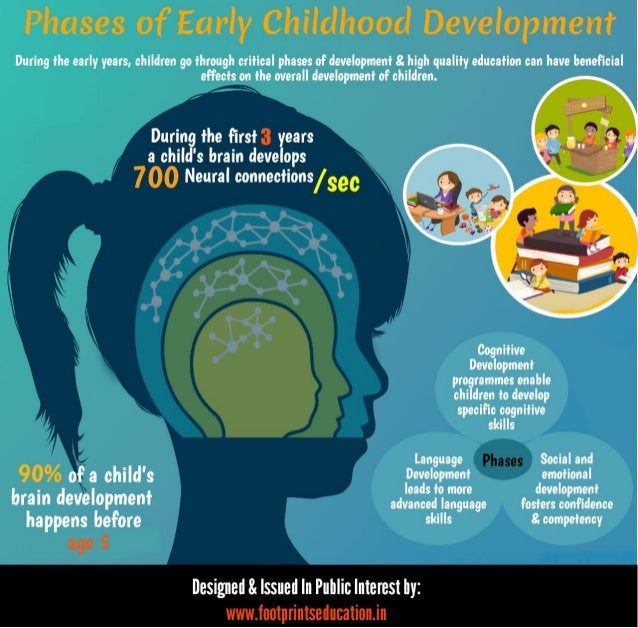 Previous research has shown that malnourished children were uncollected and did worse in school. Conclusion: in school years, the brain needs proteins, carbohydrates, omega-3s and various vitamins and minerals.
Previous research has shown that malnourished children were uncollected and did worse in school. Conclusion: in school years, the brain needs proteins, carbohydrates, omega-3s and various vitamins and minerals.
What products contain this?
Breakfast, heavy or not, gives the brain fuel to work. Toast, porridge, eggs, fruit or yogurt is a great start to the school day.
Any protein food, such as meat, fish, nuts, cheese or milk, makes the student attentive. It stimulates the feel-good hormone dopamine, helping him enjoy lessons he usually doesn't enjoy. nine0003
A peanut butter sandwich helps to transmit impulses from neuron to neuron as quickly as possible. If the student cannot tolerate peanuts, replace them with an egg, lean meat, or cheese.
Oily fish is important for both academic success and growth. Canned fish is suitable for sandwiches or rolls, which can be given to the child with him to school.
Try adding fruits and vegetables to every meal to ensure you get a full complement of brain-friendly vitamins and minerals.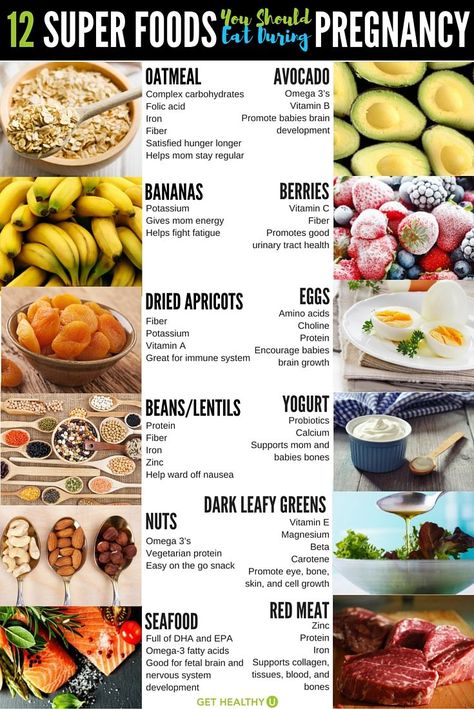 It's also a good solution for a healthy break snack. No proper food can replace a good night's sleep. At the lesson, at the stadium or at the exam, the child will be able to do much more if he gets enough sleep. nine0003
It's also a good solution for a healthy break snack. No proper food can replace a good night's sleep. At the lesson, at the stadium or at the exam, the child will be able to do much more if he gets enough sleep. nine0003
Adults
- Photo
- Getty Images/E+
What does the brain need?
About 2/3 of each brain cell consists of fats. To effectively send messages, its walls must be flexible, which depends on their content of omega-3. If there are too few of them, the cell walls become rigid, if there are too many, they become soft and sluggish. It all depends on the right amount. The ratio between omega-6 and omega-4 is also important as these two types of fat compete with each other. Omega-3s will be neutralized if they are dominated by omega-6s. Since we get a lot of omega-6 from food (from vegetable oils), it is recommended to eat more food containing omega-3, such as oily fish.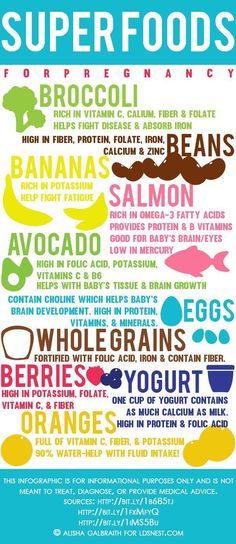 nine0003
nine0003
With over 40 years of experience, we want to think as clearly and quickly as possible. To perform at its best, the adult brain needs a continuous supply of energy throughout the day. Only starchy carbohydrates can provide this.
What products contain this?
Wherever you eat: at home, in the car or at work, breakfast is just as important for an adult as it is for a student. Eating only air, you will not be able to fully work.
If morning tea is part of your workflow, pair it with a fruitcake, a sausage roll, or a large biscuit from a local café.
Drinks containing caffeine, such as coffee and tea, are helpful throughout the day. The caffeine burst will help you in meetings and conferences, but keep in mind that it only peaks an hour after you've had coffee or tea.
Eat at regular intervals during the day, this will help you keep the fuel for the brain at the proper level. Find time for lunch. Keep an emergency supply on your desk in case you can't go to lunch.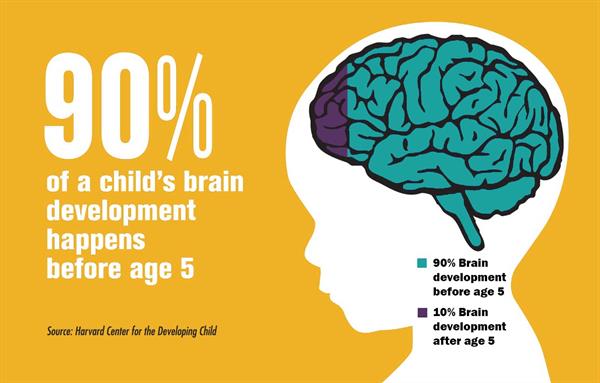 Canned fish, beans, fruit or rice pudding keep well, and crackers, nuts, or low-calorie granola bars will do as well. nine0003
Canned fish, beans, fruit or rice pudding keep well, and crackers, nuts, or low-calorie granola bars will do as well. nine0003
Avoid chocolate or muffins in the middle of the day when energy levels are low. But don't give up sugar altogether. After lunch, take a walk around the office or get some air to stimulate the brain. If you weren't able to eat lunch, eat a sandwich or fruit for a long-term energy boost.
The elderly
- Photo
- Getty Images/Image Source
As we age, our brain becomes more like a sieve. Brings memory, reactions. It is more difficult for us to remember, even more difficult to remember, analyze, focus on the thought process. And this, in essence, is a natural phenomenon: our gray matter, like the whole body, is subject to the process of oxidation - the same one that corrodes metal with rust, or covers an overripe apple with brown spots.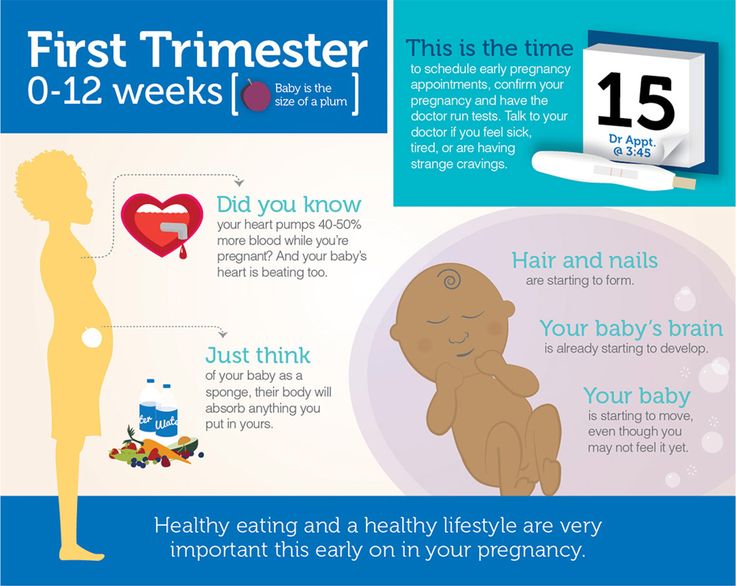 This is why as we age, more than ever, our brains need antioxidants and B vitamins, especially choline. nine0003
This is why as we age, more than ever, our brains need antioxidants and B vitamins, especially choline. nine0003
What products contain it?
The main allies in the fight against brain aging are antioxidant-rich fruits and vegetables. By the way, they also help to slow down oxidative processes throughout the body, moreover, without any plastic surgery. Include carrots, beets, broccoli, tomatoes, kiwi, blueberries, avocados in your diet. In addition, the “menu” of a mature brain must include nuts and seeds, cereals, butter and dark chocolate (necessarily of high quality). These products inhibit the oxidation of gray matter. nine0003
To get the vitamins of group B necessary for the normal functioning of the brain in old age, you need to eat various types of meat, citrus fruits, vegetables, grain bread. The most useful product for the brain of an aged person is an egg, a source of choline. It has been scientifically proven that people with Alzheimer's disease and senile dementia have a lower content in the body of such an important substance for the functioning of the brain as acetylcholine.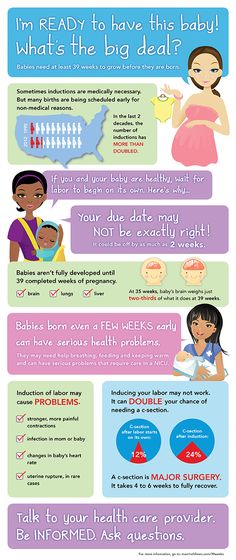 You can prevent its decrease in the body by eating eggs, milk, liver and red cabbage. There are a number of studies proving that the so-called "Mediterranean diet" (fatty fish, fresh fruits and vegetables) is useful for older people to prevent the development of senile dementia. nine0003
You can prevent its decrease in the body by eating eggs, milk, liver and red cabbage. There are a number of studies proving that the so-called "Mediterranean diet" (fatty fish, fresh fruits and vegetables) is useful for older people to prevent the development of senile dementia. nine0003
Don't forget about the benefits of an active lifestyle in adulthood - no matter how good your diet is, but adequate exercise for the brain is also important.
10 products, beneficial for the brain at any age:
-
BLACK
-
Cranberry
-
Fat fish, tuna, sardins, salmon
-
901 901 901 901 901 901 901 901 Nuts: hazelnuts, peanuts, cashews
-
Claires and MURULY
-
Bread
-
Eggs
-
Red -haired cabbage
-
Yogurt
Anna Borisova, Svetlana Luboshits
Smart nutrition - Smart child - Aptaclub.ee memory, which have a beneficial effect on the general mental abilities of the child and his perception! nine0003
The child's brain develops most intensively before the age of 3 years.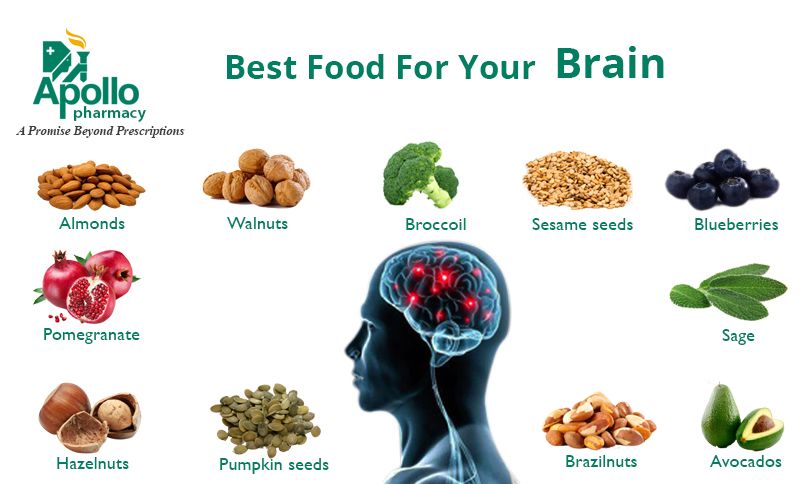 The same applies to the immune system. Therefore, in this age period (starting from 6 months, when complementary foods are added to mother's milk), parents should try to ensure that the baby receives the nutrition necessary for its development. Let's try to figure out which nutrients are important at this stage, what their functions are, and how they affect the physical and spiritual health of the baby.
The same applies to the immune system. Therefore, in this age period (starting from 6 months, when complementary foods are added to mother's milk), parents should try to ensure that the baby receives the nutrition necessary for its development. Let's try to figure out which nutrients are important at this stage, what their functions are, and how they affect the physical and spiritual health of the baby.
Nutrition and its influence on the development and activity of the child's brain
While mommy feeds her baby with her milk, the baby receives all the necessary nutrients and vitamins, as well as substances that strengthen the immune system and contribute to the successful development and functioning of the baby's brain. But when the complementary feeding period begins, it is important to pay attention to whether the child is getting the necessary nutrients from food. It must also be understood that the child's menu is different from the adult's menu. A balanced diet with the right proportions of nutrients and vitamins is of great importance for a child to grow up not only physically strong, with a good immune system, but also have a stable nervous system, good memory and ability to concentrate.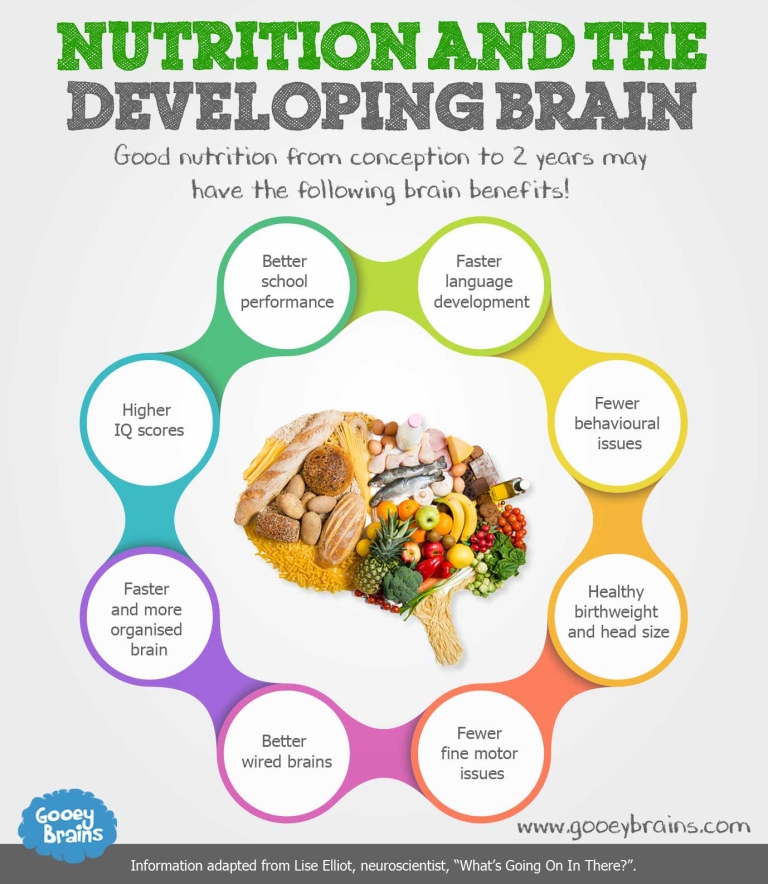 This will further affect school success and overall health. nine0003
This will further affect school success and overall health. nine0003
Especially important iron - it is necessary for blood circulation, which, in turn, contributes to the development of the baby's brain and provides energy. It supplies tissues with oxygen, therefore it is involved in the formation of bone tissue, teeth and in the activity of the immune system. The more the body develops, the more iron it needs. It is best obtained from lean meats. Remember that calcium prevents the absorption of iron, but vitamin C enhances it. Therefore, foods containing iron are best eaten with fresh vegetables and fruits. nine0003
If the baby is given mashed vegetables, it is advisable to start with tender vegetables, such as zucchini, pumpkin, carrots, cauliflower, and then supplement the menu with other vegetables - broccoli (which is the richest source of iron), spinach, paprika, eggplant, etc. These vegetables are also powerful antioxidants that can repair damaged cells.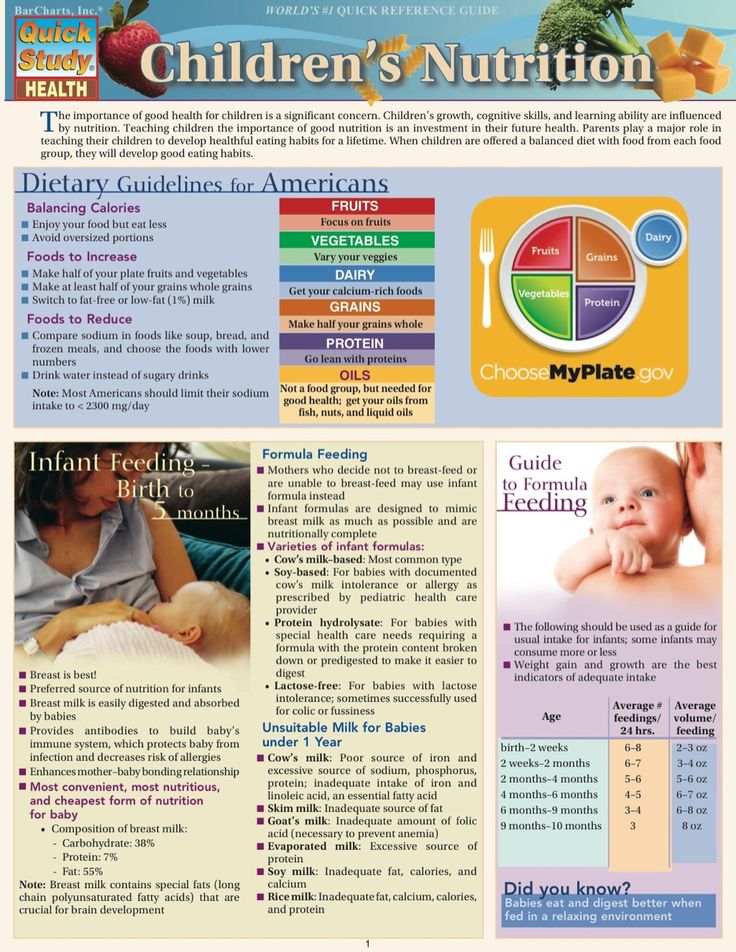 Sources of iron also include lean meats and some legumes (beans, peas), which improve brain function. In the menu of a small child (from 8 months old), it is advisable to include, first of all, tender meat - rabbit, turkey, chicken or veal (if the child does not have intolerance or allergies). The meat is best boiled or stewed, and then chopped in a blender. nine0003
Sources of iron also include lean meats and some legumes (beans, peas), which improve brain function. In the menu of a small child (from 8 months old), it is advisable to include, first of all, tender meat - rabbit, turkey, chicken or veal (if the child does not have intolerance or allergies). The meat is best boiled or stewed, and then chopped in a blender. nine0003
B vitamins - are involved in the development of the nervous system and the formation of protective sheaths of nerves. These vitamins are mainly involved in the work of the muscular and nervous systems, especially B12 and folic acid, which promotes cell repair. Therefore, B vitamins are an integral part of the child's growth process. They also contribute to the formation of red blood cells in the body and strengthen the immune system.
Dairy products are rich in proteins and B vitamins, which are important for the development and growth of brain tissue. Recommended foods are yogurt without additives, not too fatty sour cream, cheese, kefir (there is an opinion that cow's milk should not be given to a child under 3 years old, as it can cause an allergic reaction), as well as cereals.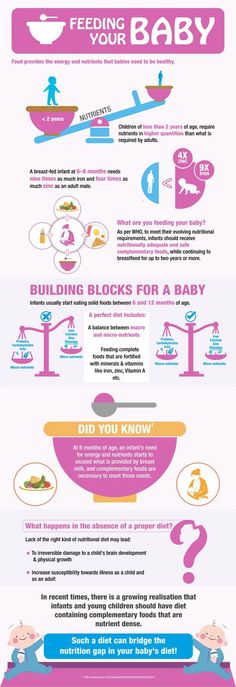 Vitamin B6 is found in all types of meat, as well as vegetables and fruits. For example, one banana contains most of the vitamin B6 needed throughout the day. Interestingly, the composition of the egg includes almost all B vitamins, unsaturated fatty acids, as well as the element choline, which improves memory. Less allergenic and more suitable in size for a small child will be quail eggs. nine0003
Vitamin B6 is found in all types of meat, as well as vegetables and fruits. For example, one banana contains most of the vitamin B6 needed throughout the day. Interestingly, the composition of the egg includes almost all B vitamins, unsaturated fatty acids, as well as the element choline, which improves memory. Less allergenic and more suitable in size for a small child will be quail eggs. nine0003
Carbohydrates - an essential part of them is glucose, which supplies the brain with energy resources. Within one minute, 100 g of the brain consumes up to 5 mg of glucose, the main substrate for respiration of brain tissues. It is interesting that, first of all, the energy of glucose is used precisely for the work of the brain, the rest of the functions in this case are secondary. Carbohydrates are an integral part of the blood, muscles, nerves and other tissues of the body. Therefore, an actively growing organism, especially in the first 3 years, they are especially necessary.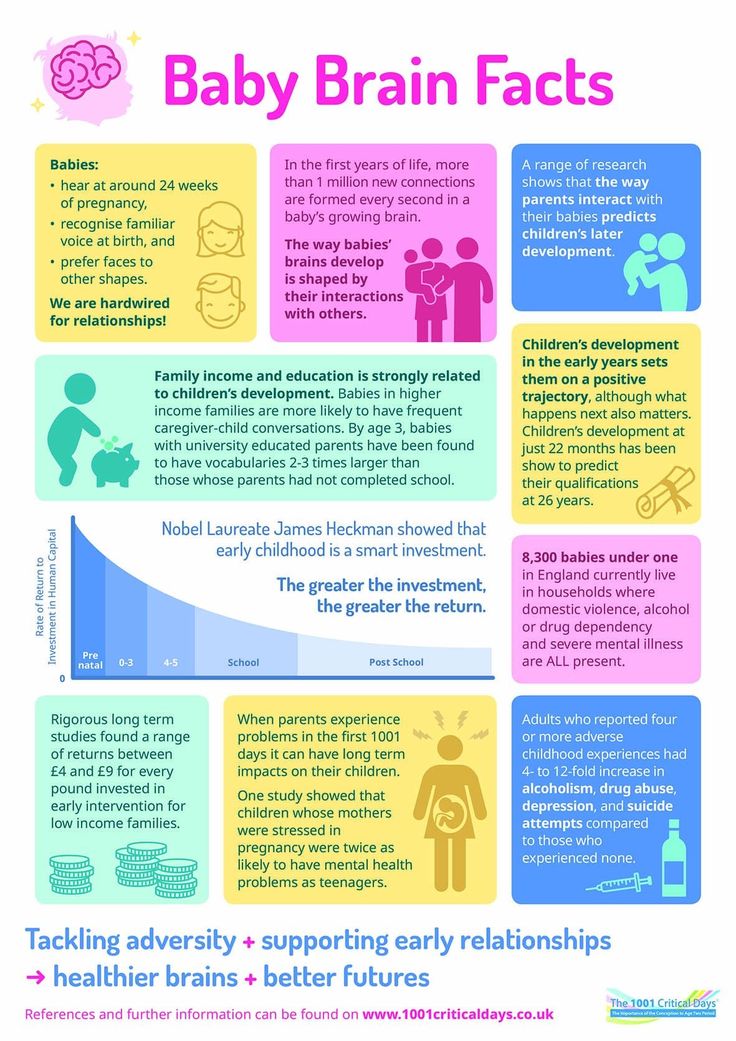 nine0003
nine0003
Carbohydrates are one of the most important nutrients in the first years of life, when the development of the baby is especially rapid. The richest source of carbohydrates are cereals (except for them, of course, fruits, berries and dairy products), since they provide the body, including the brain, with “fast” energy. Therefore, porridges from cereals are recommended, starting with rice, ending with porridges from other types of cereals. Important! You should find out if the baby has an allergic reaction to nutrients such as gluten (a protein found in grains of wheat, rye, barley and oats). nine0003
Fats - they form 60% of brain tissues. Fats are extremely important for the formation of the nervous system. Thanks to them, for example, nerve cells can grow. Fats are divided into saturated and unsaturated fatty acids. Among polyunsaturated fatty acids, the most important for nerve tissues are ALA (alpha-linolenic acid), EPA (eicosapentaenoic acid), DHA (docosahexaenoic acid), omega-3 and omega-6 fatty acids, which contribute to the full development of nerve cells, retina, heart and brain and boost the immune system.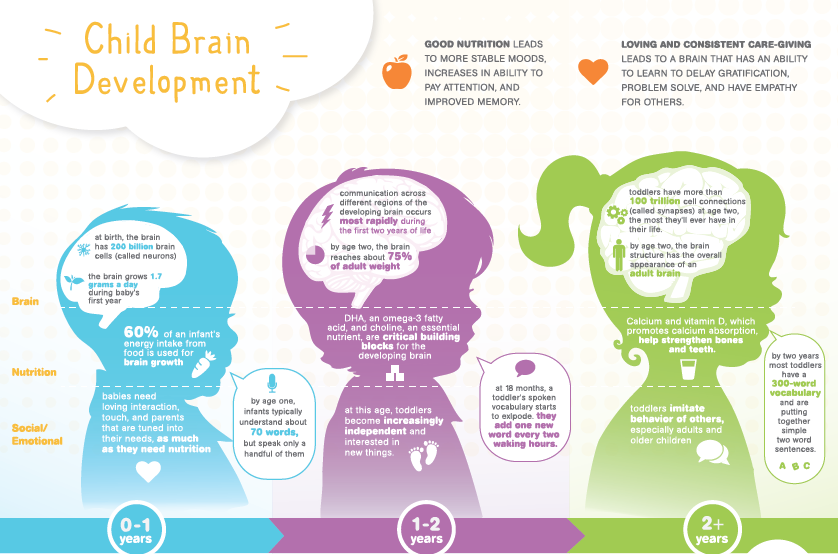 nine0003
nine0003
Considering the need of a rapidly growing body for energy, up to 3 years of age, a very large amount of fat should be included in the diet of a child. This is necessary so that the brain can develop normally, as well as for the good functioning of the hormonal system. The required amount of fatty acids can be obtained from oily sea fish, such as steamed (in a double boiler) salmon, since it contains the omega-3 acids that the body needs, which improve the cognitive function of the brain. It is also good to include white fish, such as cod fillet, in the diet of a small child. If a child refuses fish, it is worth considering the use of fish oil. It is desirable to supplement the diet with vegetable oils, for example, olive and rapeseed. It is worth remembering that the seeds of raspberries, strawberries, blackberries and strawberries are also rich in omega-3 fatty acids, and strawberries and blueberries can improve memory. nine0003
What else should be considered?
In order for the child's brain to receive all the necessary nutrients and develop normally, the child's menu must be appropriate for his age and state of health.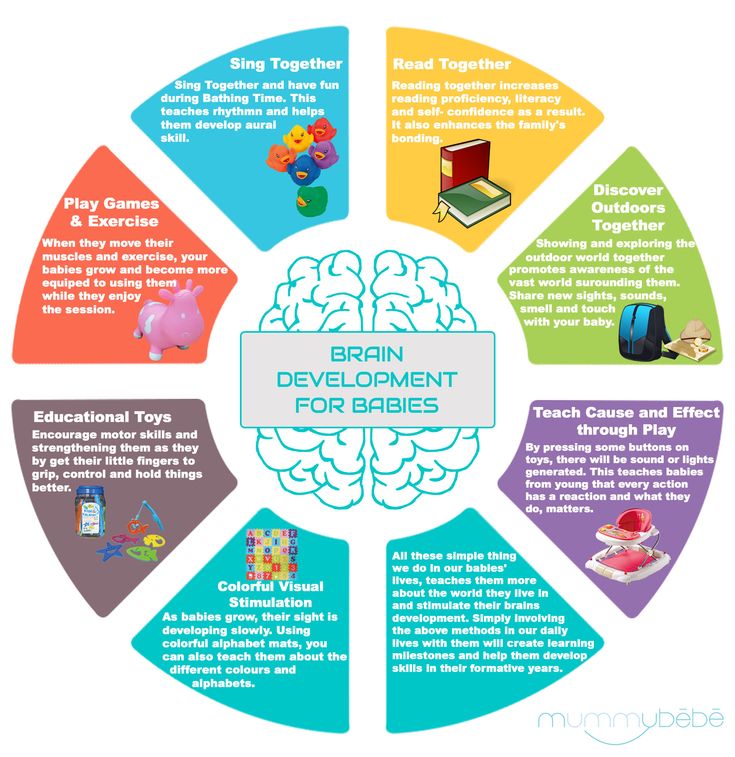 Gradually including new products in the menu, care should be taken to ensure that the child does not develop allergic reactions, therefore it is necessary to control the content of salt and sugar in the child's food. Nutrition should be healthy, balanced, varied and, of course, tasty. nine0003
Gradually including new products in the menu, care should be taken to ensure that the child does not develop allergic reactions, therefore it is necessary to control the content of salt and sugar in the child's food. Nutrition should be healthy, balanced, varied and, of course, tasty. nine0003
Often, allergic reactions in children do not come from any particular vegetable or fruit, but from the chemicals they are treated with. Therefore, it is recommended to choose, if possible, more environmentally friendly products, ideally grown on their own. Therefore, products that may contain preservatives, flavorings and colorings should be avoided.
Not only the food itself is important, but also the way it is cooked (steaming, boiling or frying). As you know, if processed incorrectly, if boiled or fried for too long, important nutrients disappear, and the food becomes of little value. A small child should take a large amount of fluid daily. It can be not only water, but also fresh fruit and vegetable juices, herbal teas, etc.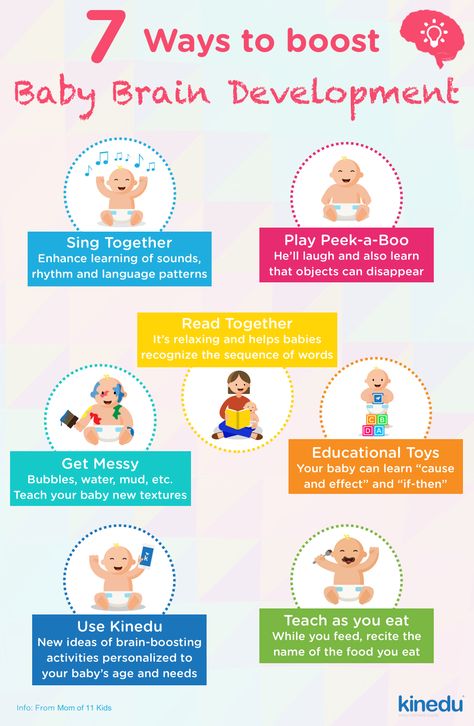
Consult your family doctor or paediatrician about the nutrition your child needs, given their age!
The ABC of feeding babies aged 1 to 3 years
The basics of healthy nutrition are mastered in the family. Slow conversations at dinner create a feeling of togetherness, joint...
DETAILS
The role of milk in the nutrition of children after a year
Good nutrition is no less important for the development of your baby than physical and mental activities. 'Cause aged...
DETAILS
Why is self-cooked food good?
Health starts at home. In an ideal world, we would all have plenty of time to plan our menu and cook for...
DETAILS
Why it is important to teach your baby to a varied diet
Good health should be taken care of from an early age.